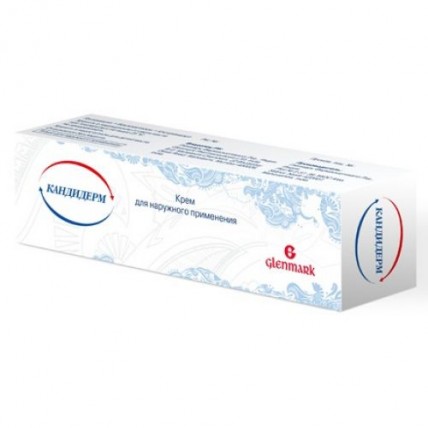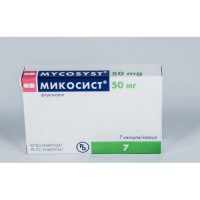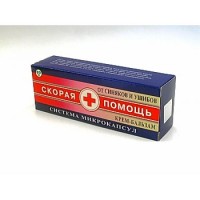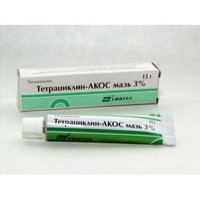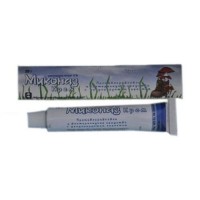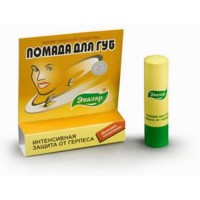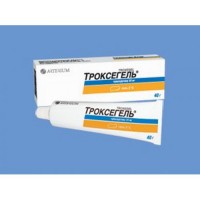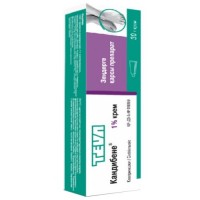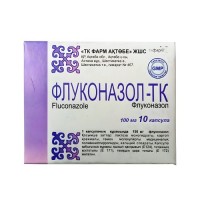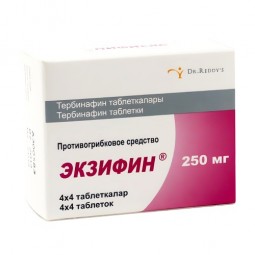KANDIDERM
the Trade name
Kandiderm
Mezhdunarodnoye the unlicensed name
Is not present
the Dosage form
Cream, 15 g
Structure
of 100 g of cream contain
active agents: Clotrimazolum of-1 g,
beclomethasone Dipropionas - 0.025 g,
Gentamycini sulfas
(it is equivalent to gentamycin) – 0.1 g
excipients: the propylene glycol tsetomakrogol emulsified, vaseline white, liquid paraffin, benzyl alcohol, methylhydroxybenzoate, propilgidroksibenzoat, hydroxytoluene bottled, sodium the diguide-rofosfat, sodium phosphate, water purified.
The description
Cream of white color
Pharmacotherapeutic group
Glucocorticosteroids for topical treatment of diseases of skin. Corticosteroids strong in a combination with other drugs.
The ATH D07XC code
the Pharmacological
Pharmacokinetics Clotrimazolum System Absorption properties of Clotrimazolum at topical administration very low, makes less than 0.5%. It is distributed in a corneal layer of skin. Concentration of Clotrimazolum in an epidermal layer of skin exceeds the minimum inhibiting concentration almost for all pathogenic fungi. The highest level of concentration in a corneal layer is from 50 to 100 mkg/ml and the lowest level in a basal layer – 1.53 - 3 mkg/ml. About 2 main metabolites and 3 inactive metabolites are metabolized. It is generally removed together with excrements and bile, renal excretion is from 0.05% to 0.5%. Elimination half-life makes from 3.5 to 5 hours. Beclomethasone
Extent of transdermal absorption of local corticosteroids is defined by many factors, including a skin surface, integrity of an epidermal barrier and also use of occlusive bandages. Corticosteroids can get through the normal uninjured skin. Inflammation and/or other disease processes in skin can increase extent of transdermal absorption. Occlusive bandages considerably increase absorption of local corticosteroids. After dermal absorption pharmacokinetic ways same, as well as at system introduction of corticosteroids.
Beclomethasone is metabolized in a liver and removed by kidneys. The exact estimates of absorption of Beclomethasone given quantitative are not known.
Gentamycin
does not result Topical administration of 0.1% of gentamycin in the found concentration of drug in blood serum or in urine. At high concentration of 5% of gentamycin, absorption through skin can reach 5%, data on system toxicity were not reported. Gentamycin is quickly soaked up through a big burn surface, the injured skin. The got drug almost completely is removed in not changed look by kidneys (70% up to 100%) and is minimum with bile.
A pharmacodynamics
Kandiderm - anti-inflammatory, antiallergic, antibacterial, antifungal drug.
The anti-mycotic effect of Clotrimazolum (derivative an imidazole) is connected with disturbance of synthesis of ergosterol, is a part of a cellular membrane of mushrooms that changes permeability of a membrane and causes the subsequent lysis of a cell. In fungicide concentration interacts with mitochondrial and peroksidazny enzymes therefore there is an increase in concentration of peroxide of hydrogen up to toxic level that also promotes destruction of fungal cells. Shows fungicide and fungistatic activity concerning dermatomitset (Trichophyton rub-rum, Trichophyton mentagrophytes, Epidermophyton floccosum, Microsporum canis), yeast-like and mold mushrooms (Candida spp., including
Candida albicans, Torulopsis glabrata, the sorts Rhodotorula, Pityrosporum orbiculare). It is active concerning the activator multi-colored depriving – Pityrosporum orbiculare (Malassezia furfur). It is effective concerning grammmpolozhitelny bacteria – the activator of an erythrasma Corynebacterium minutissimum and also Staphylococcus spp., Streptococcus spp., gram-negative bacteria – Bacteroides, Gardnerella vaginalis.
Beclomethasone is the halogenated corticosteroid. Renders anti-inflammatory, antiallergic, anti-exudative and antipruritic action. Beclomethasone slows down accumulation of leukocytes, release of lizosomalny enzymes and mediators of inflammation, phagocytosis oppresses, reduces vascular and fabric permeability, interferes with formation of inflammatory hypostasis.
Gentamycin – an antibiotic of a broad spectrum of activity from group of aminoglycosides, has bactericidal effect concerning almost all gram-negative bacteria: Pseudomonas aeruginosa, Enterobacter aerogenes, Escherichia coli, Proteus vulgaris, Klebsiella pneumoniae and gram-positive microorganisms: Streptococcus spp., Staphylococcus aureus.
Indications
- the dermatosis complicated by consecutive infection
- epidermophitias of feet
- the dermatomycoses (including with localization in inguinal area) caused by activators, sensitive to drug.
Route of administration and doses
Outwardly. Cream is applied with a thin layer on affected areas of skin by 2 times a day (in the morning and in the evening). Duration of a course of treatment depends on the amount of localization of defeat, sensitivity of the patient.
At children it is not applied it is long both on big sites and under occlusive bandages, on doctor's orders.
Side effects
- burning sensation, an erythema, exudation, pigmentation disturbance (hypopigmentation), an itching.
The side reactions caused by topical administration of beclomethasone:
- xeroderma, folliculitis, hypertrichosis, eels, perioral dermatitis, allergic contact dermatitis, maceration of skin, development of secondary resistant flora, atrophy of skin, striya, heat rash.
The side reactions caused by Clotrimazolum:
- erythema, emergence of bubbles, peeling, local hypostasis, small tortoiseshell, general irritation of skin.
The side reactions caused by gentamycin:
- hyperaemia, an itching (usually do not demand the treatment termination).
Side reactions at children
- oppression gipotalamo - a hypophysial and adrenal system
- Cushing's syndrome
- a speech delay
- increase in intracranial pressure
of the Contraindication
– hypersensitivity to drug components
– a tuberculosis cutis, skin manifestations of syphilis
- chicken pox, a herpes simplex, skin vaccine-challenged reactions
- open wounds
– children's age up to 2 years
With care: pregnancy the I trimester, children's age
Medicinal interactions
are not established
the Special
instructions Kandiderm is not intended for use in ophthalmology. Not to apply to skin in eyes. Long local use of antibiotics can sometimes lead to growth of resistant microflora. In this case and also at development of irritation, a sensitization or superinfection against the background of treatment it is necessary to stop and appoint the corresponding therapy. Cross allergic reactions with aminoglikozidny antibiotics were observed.
Any side effects which are found at use of system glucocorticosteroids, including oppression of function of bark of adrenal glands, can be noted also at topical administration of glucocorticosteroids, in particular at babies and children.
System absorption of glucocorticosteroids or gentamycin at topical administration will be higher if treatment is carried out on big body surfaces or when using occlusive bandages. It is necessary to avoid putting gentamycin on open wounds or injuries of skin.
At long use of drug its cancellation is recommended to be carried out gradually.
Use in pediatrics
At children perhaps more frequent emergence of signs of oppression gipotalamo - a hypophysial and adrenal system and emergence of outer corticosteroid effects under the influence of local kortikosteriod, than at adult patients that is connected with bigger absorption because of a bigger ratio of surface area of skin to body weight. It is not applied under occlusive bandages.
Pregnancy and the period of a lactation
Safety of use of local glucocorticosteroids for pregnant women is not proved. Appointment of this group of drugs during pregnancy is justified only if the potential advantage for the woman exceeds potential risk for a fruit. During pregnancy, drugs of this group should not be used in high doses or it is long.
It is not known whether can lead topical administration of corticosteroids through system absorption to emergence them in mother's milk. The decision on the termination of breastfeeding or drug withdrawal should be accepted taking into account need of use of drug for mother.
Features of influence of medicine on ability to run the vehicle or potentially dangerous mechanisms.
Not established
Overdose
Symptoms: hypercorticoidism (increase in body weight, formation of hypostases, hypertensia, glucosuria, hypopotassemia).
Treatment: symptomatic treatment. If necessary carry out correction of electrolytic balance. In case of chronic toxic action the gradual cancellation of corticosteroids is recommended. With an excess growth of resistant microorganisms, it is recommended to stop treatment by Kandiderm and to appoint necessary therapy.
A form of release and packing
On 15 g of drug in an aluminum tuba. The tuba together with the instruction for medical use in the state and Russian languages is placed in cardboard packing.
To Store storage conditions in the dry, protected from light place at a temperature not above 25 °C.
To store out of children's reach!
3 years
not to apply a period of storage after an expiration date.
Prescription status
According to the prescription
of Proizvoditel Glenmark Pharmasyyutikalz Ltd, the RAFT No. E 37.39, MIDS of Area, Saptur, Nasik – 422007, Maharashtra, India.
To develop
the Trade name
Kandiderm
Mezhdunarodnoye the unlicensed name
Is not present
the Dosage form
Cream, 15 g
Structure
of 100 g of cream contain
active agents: Clotrimazolum of-1 g,
beclomethasone Dipropionas - 0.025 g,
Gentamycini sulfas
(it is equivalent to gentamycin) – 0.1 g
excipients: the propylene glycol tsetomakrogol emulsified, vaseline white, liquid paraffin, benzyl alcohol, methylhydroxybenzoate, propilgidroksibenzoat, hydroxytoluene bottled, sodium the diguide-rofosfat, sodium phosphate, water purified.
The description
Cream of white color
Pharmacotherapeutic group
Glucocorticosteroids for topical treatment of diseases of skin. Corticosteroids strong in a combination with other drugs.
The ATH D07XC code
the Pharmacological
Pharmacokinetics Clotrimazolum System Absorption properties of Clotrimazolum at topical administration very low, makes less than 0.5%. It is distributed in a corneal layer of skin. Concentration of Clotrimazolum in an epidermal layer of skin exceeds the minimum inhibiting concentration almost for all pathogenic fungi. The highest level of concentration in a corneal layer is from 50 to 100 mkg/ml and the lowest level in a basal layer – 1.53 - 3 mkg/ml. About 2 main metabolites and 3 inactive metabolites are metabolized. It is generally removed together with excrements and bile, renal excretion is from 0.05% to 0.5%. Elimination half-life makes from 3.5 to 5 hours. Beclomethasone
Extent of transdermal absorption of local corticosteroids is defined by many factors, including a skin surface, integrity of an epidermal barrier and also use of occlusive bandages. Corticosteroids can get through the normal uninjured skin. Inflammation and/or other disease processes in skin can increase extent of transdermal absorption. Occlusive bandages considerably increase absorption of local corticosteroids. After dermal absorption pharmacokinetic ways same, as well as at system introduction of corticosteroids.
Beclomethasone is metabolized in a liver and removed by kidneys. The exact estimates of absorption of Beclomethasone given quantitative are not known.
Gentamycin
does not result Topical administration of 0.1% of gentamycin in the found concentration of drug in blood serum or in urine. At high concentration of 5% of gentamycin, absorption through skin can reach 5%, data on system toxicity were not reported. Gentamycin is quickly soaked up through a big burn surface, the injured skin. The got drug almost completely is removed in not changed look by kidneys (70% up to 100%) and is minimum with bile.
A pharmacodynamics
Kandiderm - anti-inflammatory, antiallergic, antibacterial, antifungal drug.
The anti-mycotic effect of Clotrimazolum (derivative an imidazole) is connected with disturbance of synthesis of ergosterol, is a part of a cellular membrane of mushrooms that changes permeability of a membrane and causes the subsequent lysis of a cell. In fungicide concentration interacts with mitochondrial and peroksidazny enzymes therefore there is an increase in concentration of peroxide of hydrogen up to toxic level that also promotes destruction of fungal cells. Shows fungicide and fungistatic activity concerning dermatomitset (Trichophyton rub-rum, Trichophyton mentagrophytes, Epidermophyton floccosum, Microsporum canis), yeast-like and mold mushrooms (Candida spp., including
Candida albicans, Torulopsis glabrata, the sorts Rhodotorula, Pityrosporum orbiculare). It is active concerning the activator multi-colored depriving – Pityrosporum orbiculare (Malassezia furfur). It is effective concerning grammmpolozhitelny bacteria – the activator of an erythrasma Corynebacterium minutissimum and also Staphylococcus spp., Streptococcus spp., gram-negative bacteria – Bacteroides, Gardnerella vaginalis.
Beclomethasone is the halogenated corticosteroid. Renders anti-inflammatory, antiallergic, anti-exudative and antipruritic action. Beclomethasone slows down accumulation of leukocytes, release of lizosomalny enzymes and mediators of inflammation, phagocytosis oppresses, reduces vascular and fabric permeability, interferes with formation of inflammatory hypostasis.
Gentamycin – an antibiotic of a broad spectrum of activity from group of aminoglycosides, has bactericidal effect concerning almost all gram-negative bacteria: Pseudomonas aeruginosa, Enterobacter aerogenes, Escherichia coli, Proteus vulgaris, Klebsiella pneumoniae and gram-positive microorganisms: Streptococcus spp., Staphylococcus aureus.
Indications
- the dermatosis complicated by consecutive infection
- epidermophitias of feet
- the dermatomycoses (including with localization in inguinal area) caused by activators, sensitive to drug.
Route of administration and doses
Outwardly. Cream is applied with a thin layer on affected areas of skin by 2 times a day (in the morning and in the evening). Duration of a course of treatment depends on the amount of localization of defeat, sensitivity of the patient.
At children it is not applied it is long both on big sites and under occlusive bandages, on doctor's orders.
Side effects
- burning sensation, an erythema, exudation, pigmentation disturbance (hypopigmentation), an itching.
The side reactions caused by topical administration of beclomethasone:
- xeroderma, folliculitis, hypertrichosis, eels, perioral dermatitis, allergic contact dermatitis, maceration of skin, development of secondary resistant flora, atrophy of skin, striya, heat rash.
The side reactions caused by Clotrimazolum:
- erythema, emergence of bubbles, peeling, local hypostasis, small tortoiseshell, general irritation of skin.
The side reactions caused by gentamycin:
- hyperaemia, an itching (usually do not demand the treatment termination).
Side reactions at children
- oppression gipotalamo - a hypophysial and adrenal system
- Cushing's syndrome
- a speech delay
- increase in intracranial pressure
of the Contraindication
– hypersensitivity to drug components
– a tuberculosis cutis, skin manifestations of syphilis
- chicken pox, a herpes simplex, skin vaccine-challenged reactions
- open wounds
– children's age up to 2 years
With care: pregnancy the I trimester, children's age
Medicinal interactions
are not established
the Special
instructions Kandiderm is not intended for use in ophthalmology. Not to apply to skin in eyes. Long local use of antibiotics can sometimes lead to growth of resistant microflora. In this case and also at development of irritation, a sensitization or superinfection against the background of treatment it is necessary to stop and appoint the corresponding therapy. Cross allergic reactions with aminoglikozidny antibiotics were observed.
Any side effects which are found at use of system glucocorticosteroids, including oppression of function of bark of adrenal glands, can be noted also at topical administration of glucocorticosteroids, in particular at babies and children.
System absorption of glucocorticosteroids or gentamycin at topical administration will be higher if treatment is carried out on big body surfaces or when using occlusive bandages. It is necessary to avoid putting gentamycin on open wounds or injuries of skin.
At long use of drug its cancellation is recommended to be carried out gradually.
Use in pediatrics
At children perhaps more frequent emergence of signs of oppression gipotalamo - a hypophysial and adrenal system and emergence of outer corticosteroid effects under the influence of local kortikosteriod, than at adult patients that is connected with bigger absorption because of a bigger ratio of surface area of skin to body weight. It is not applied under occlusive bandages.
Pregnancy and the period of a lactation
Safety of use of local glucocorticosteroids for pregnant women is not proved. Appointment of this group of drugs during pregnancy is justified only if the potential advantage for the woman exceeds potential risk for a fruit. During pregnancy, drugs of this group should not be used in high doses or it is long.
It is not known whether can lead topical administration of corticosteroids through system absorption to emergence them in mother's milk. The decision on the termination of breastfeeding or drug withdrawal should be accepted taking into account need of use of drug for mother.
Features of influence of medicine on ability to run the vehicle or potentially dangerous mechanisms.
Not established
Overdose
Symptoms: hypercorticoidism (increase in body weight, formation of hypostases, hypertensia, glucosuria, hypopotassemia).
Treatment: symptomatic treatment. If necessary carry out correction of electrolytic balance. In case of chronic toxic action the gradual cancellation of corticosteroids is recommended. With an excess growth of resistant microorganisms, it is recommended to stop treatment by Kandiderm and to appoint necessary therapy.
A form of release and packing
On 15 g of drug in an aluminum tuba. The tuba together with the instruction for medical use in the state and Russian languages is placed in cardboard packing.
To Store storage conditions in the dry, protected from light place at a temperature not above 25 °C.
To store out of children's reach!
3 years
not to apply a period of storage after an expiration date.
Prescription status
According to the prescription
of Proizvoditel Glenmark Pharmasyyutikalz Ltd, the RAFT No. E 37.39, MIDS of Area, Saptur, Nasik – 422007, Maharashtra, India.
To develop
